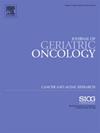The effect of YOCAS©® yoga on cancer-related fatigue and quality of life in older (60+) vs. younger (≤ 59) cancer survivors: Secondary analysis of a nationwide, multicenter, phase 3 randomized controlled trial
IF 3
3区 医学
Q3 GERIATRICS & GERONTOLOGY
引用次数: 0
Abstract
Introduction
Older cancer survivors consistently express the need for interventions to reduce cancer-related fatigue (CRF) and maintain quality of life (QOL). Yoga is a promising treatment to address CRF and QOL. However, research comparing the efficacy of yoga for improving fatigue and QOL in older survivors (60+) vs. younger adult survivors (≤59)is limited. Our objective was to examine the effects of yoga on CRF and QOL in older survivors vs. younger survivors.
Materials and Methods
We conducted a secondary analysis of a nationwide, multicenter, phase 3 randomized controlled trial. For this study, participants who provided evaluable pre- and post-intervention data on the Functional Assessment for Chronic Illness Therapy-Fatigue (FACIT-F) and the Functional Assessment for Cancer Therapy-General (FACT-G) were eligible. The yoga intervention comprises gentle Hatha and Restorative Yoga and includes breathing exercises, physical alignment postures, and mindfulness.
Results
Of the 177 participants included in the study, 30.1 % were aged 60+ and 69.9 % were aged ≤59. More younger participants had breast cancer (82.0 % vs. 59.2 %. p = 0.009), surgery (98.9 % vs. 77.8 %, p < 0.001), and chemotherapy (80.5 % vs. 55.6 %, p = 0.001). There were no differences in the cancer stage (66.1 % stage I or II). There were statistically significant and clinically meaningful within-group improvements from baseline to post-intervention in CRF for participants aged ≤59 and participants aged 60+ (4.0 ± 0.7, p < 0.001 vs. 3.1 ± 1.0, p = 0.003). Both age groups also demonstrated improvements in QOL (3.2 ± 0.8, p < 0.001 vs. 2.1 ± 1.2, p = 0.078), physical (1.6 ± 0.3, p < 0.001 vs. 0.8 ± 0.5, p = 0.084), functional (0.7 ± 0.3, p = 0.048 vs. 1.0 ± 0.5, p = 0.037), and emotional well-being. There were no significant between-group differences between the age groups. Most younger and older participants reported that yoga helped improve their sleep quality (92.8 % vs 88.5 %) and they would recommend it to other survivors (98.2 % vs 90.4 %).
Discussion
Older cancer survivors who undergo gentle Hatha and restorative yoga performed two to three times per week for four weeks at a low to moderate level of intensity have similar improvements in CRF and QOL compared to participants aged ≤59. For older survivors experiencing these toxicities, it is reasonable for clinicians to prescribe yoga.
ClinicalTrials.gov identifier: NCT00397930
YOCAS©® 瑜伽对老年(60 岁以上)与年轻(≤ 59 岁)癌症幸存者癌症相关疲劳和生活质量的影响:一项全国性、多中心、第三阶段随机对照试验的二次分析。
导言:老年癌症幸存者一直表示需要干预措施来减轻癌症相关疲劳(CRF)并保持生活质量(QOL)。瑜伽是解决 CRF 和 QOL 问题的一种很有前景的治疗方法。然而,比较瑜伽对老年幸存者(60 岁以上)与年轻的成年幸存者(≤59 岁)改善疲劳和 QOL 的效果的研究还很有限。我们的目的是研究瑜伽对老年幸存者与年轻幸存者的 CRF 和 QOL 的影响:我们对一项全国性多中心 3 期随机对照试验进行了二次分析。在这项研究中,提供慢性疾病治疗疲劳功能评估(FACIT-F)和癌症治疗一般功能评估(FACT-G)干预前后可评估数据的参与者均符合条件。瑜伽干预包括温和的哈达瑜伽和恢复性瑜伽,包括呼吸练习、身体对齐姿势和正念:在参与研究的 177 名参与者中,30.1% 年龄在 60 岁以上,69.9% 年龄在 59 岁以下。更多的年轻参与者患有乳腺癌(82.0% 对 59.2%,P = 0.009),并接受了手术(98.9% 对 77.8%,P 讨论:与年龄小于 59 岁的参与者相比,每周进行 2 到 3 次、持续四周、强度为中低水平的温和哈达瑜伽和恢复性瑜伽训练的老年癌症幸存者在 CRF 和 QOL 方面有相似的改善。对于出现这些毒性反应的老年幸存者,临床医生开出瑜伽处方是合理的:NCT00397930。
本文章由计算机程序翻译,如有差异,请以英文原文为准。
求助全文
约1分钟内获得全文
求助全文
来源期刊

Journal of geriatric oncology
ONCOLOGY-GERIATRICS & GERONTOLOGY
CiteScore
5.30
自引率
10.00%
发文量
379
审稿时长
80 days
期刊介绍:
The Journal of Geriatric Oncology is an international, multidisciplinary journal which is focused on advancing research in the treatment and survivorship issues of older adults with cancer, as well as literature relevant to education and policy development in geriatric oncology.
The journal welcomes the submission of manuscripts in the following categories:
• Original research articles
• Review articles
• Clinical trials
• Education and training articles
• Short communications
• Perspectives
• Meeting reports
• Letters to the Editor.
 求助内容:
求助内容: 应助结果提醒方式:
应助结果提醒方式:


